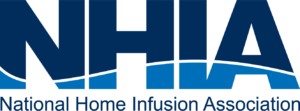Education on New Standards for Sterile Compounding
Recent changes to USP General Chapter <797> standards for sterile compounding, which are due for implementation this fall, were a key focus of NHIA’s Sterile Compounding Clinic. Selma Mitchie from USP explained the patient safety rationale behind the most recent standards updates and there were several opportunities throughout the conference to connect with expert panels to better understand the details required for implementation.
NHIA also announced its upcoming Sterile Compounding Advanced Certification Training (ACT), written by industry expert Abby Roth and reviewed by the NHIA Sterile Compounding Committee. The program, which will be available via NHIA University in the coming months, will be the definitive preparation course for USP <797> designated persons and standards compliance as well as prepare pharmacists and technicians for sterile compounding certification exams.
Prioritizing Health Equity
Inequities in how people access and receive health care could cost the health care system $1 trillion by 2040, according to Cristina Ritchey from Optum Infusion Pharmacy. Models that address inequities can go a long way toward improving health care delivery, outcomes, and population health, said Ritchey, setting the stage for several sessions dedicated to health equity.
When providers use inclusive language, transgender and gender-diverse (TGD) individuals report an overall more positive experience, are more engaged in their care, and see improvement in mood disorder and a 50% decrease in suicidality, says Alex Mills, co-director of the Center for Gender and Sexual Minority Health at the University of Mississippi School of Pharmacy/Medical Center. According to Mills, 40% of TGD have attempted suicide. Many LGBTQ individuals begin to overcome depression when they embrace their sexual orientation or gender identify (SOGI)—supporting them with a gender affirming environment is literally lifesaving, he says.
Keynote speaker Erika McMullen says that providing culturally responsive care can address inequities as well as consider the unique needs of each patient. The key to culturally responsive care is asking, “How can I respond in this moment in a way that seeks to understand, demonstrates genuine interest and compassion, and values the patient’s culture?”
Recognizing Product and Research Innovation
NHIA presented its inaugural Innovation Award to Gasgon Medical for AirVault, a novel closed-system air trap that safely, proactively removes air in line, helping clinicians and patients avoid alarms, maintenance, and delays in care. The award recognizes a game-changing infusion industry product or service. A panel of NHIA member-expert clinicians evaluated exhibitor products and services introduced within the last 2 years for their ability to improve quality and safety, boost efficiency, or reduce administrative burden for providers.
The National Home Infusion Foundation recognized outstanding research among more than 30 abstracts presented at this year’s conference. Kassie Klasen, PharmD from M Health Fairview was selected as the winner of the NHIF Outstanding Abstract Achievement Award for her poster, “COVID Sequelae: Evaluation of the Effect of Treatment on Healthcare Utilization and Health Status in the Months Following COVID-19 Infection”. The winning abstract, which includes $1,000 grant and the opportunity to publish a full manuscript in Infusion Journal, must be relevant to a current challenge, issue, or question facing the infusion industry; employ an effective study design/methodology to achieve results; and have the ability for expansion into a larger study. Jennifer Zhao, a PharmD candidate who interned at Johns Hopkins Home Care Group, won the honorary mention for “Development of Productivity Standards of Ambulatory Infusion Suite Nurses within a Multi-Entity Health System“.
